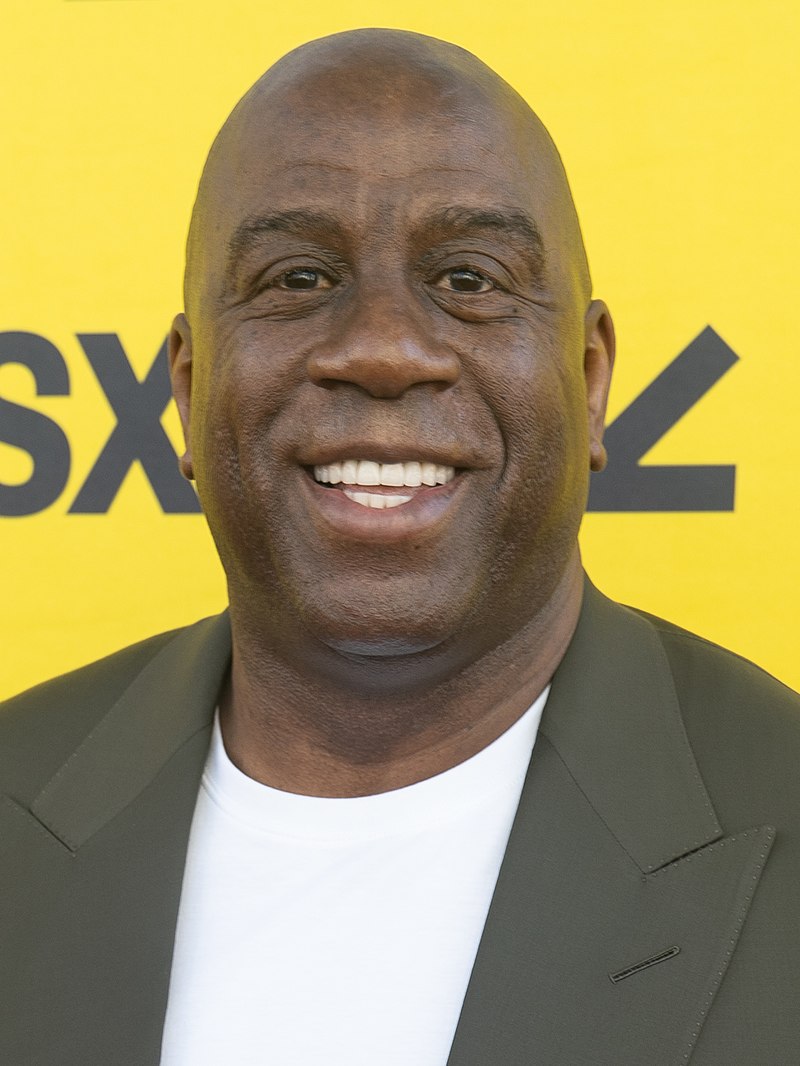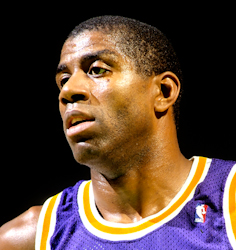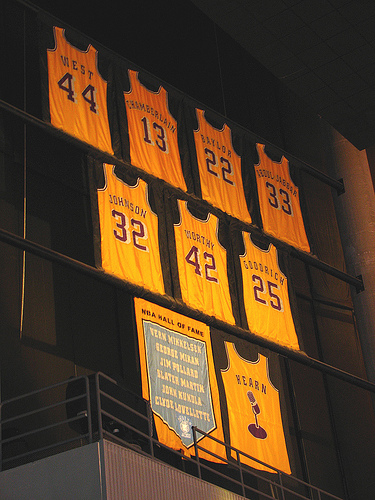Magic Johnson (Part 1)
Magic Johnson (Part 1)

Earvin "Magic" Johnson Jr., born on August 14, 1959, is a towering figure in both the basketball world and the realm of business and philanthropy. His impact on the game of basketball, particularly during his tenure with the Los Angeles Lakers, is immeasurable, earning him a place among the greatest players in NBA history.
Johnson's basketball journey began at Michigan State University, where he led the Spartans to a national championship in 1979 before making the leap to the NBA as the first overall pick in the 1979 draft. From the moment he stepped onto the court for the Lakers, Johnson's mesmerizing talent and unparalleled court vision transformed the team into a powerhouse, propelling them to five NBA championships during the iconic "Showtime" era.
Beyond his numerous accolades and championships, Johnson's impact transcends statistics. His magnetic personality, infectious smile, and unparalleled ability to elevate the play of those around him made him not only a beloved figure among fans but also a transformative force in the game of basketball.
However, Johnson's career took an unexpected turn in 1991 when he announced his retirement after contracting HIV, a diagnosis that sent shockwaves throughout the sports world. Despite this setback, Johnson's resilience and determination were on full display as he returned to the court in the 1992 All-Star Game, showcasing his unparalleled skill and winning the All-Star MVP Award.
Off the court, Johnson's advocacy for HIV/AIDS prevention, safe sex, and philanthropic endeavors have left an indelible mark on society. His entrepreneurial spirit and business acumen have made him a successful businessman, with ventures spanning from sports ownership to real estate and beyond.
As a two-time inductee into the Naismith Memorial Basketball Hall of Fame and a member of both the NBA 50 Greatest Players and NBA 75th Anniversary Team, Johnson's legacy as a basketball icon is secure. However, it is his impact as a humanitarian, entrepreneur, and advocate that truly sets him apart, cementing his status as a true legend both on and off the court.
Earvin Johnson Jr.'s upbringing in Lansing, Michigan, was marked by strong familial bonds and a deep-rooted work ethic instilled by his parents, Earvin Sr. and Christine. Despite facing challenges, such as teasing from neighborhood children and racial tensions at school, Johnson's parents' unwavering dedication to their work served as a guiding example for him.
Raised in the Seventh-day Adventist Church by his mother, Johnson developed a passion for basketball from a young age. Inspired by legends like Bill Russell, Earl Monroe, and Marques Haynes, he honed his skills tirelessly, drawing on lessons from his father, who had also played basketball in high school, and his mother, who had a love for the game.
Johnson's journey in basketball took a turn when he was bused to Everett High School instead of attending the nearby Sexton High School, where he had hoped to play. Despite initial challenges and racial tensions at Everett, Johnson's resilience and leadership qualities emerged, ultimately shaping his perspective and preparing him to navigate diverse environments.
Reflecting on his time at Everett, Johnson acknowledged the transformative impact it had on him, teaching him valuable lessons about understanding and communication across racial divides. Through adversity, he emerged stronger and more compassionate, laying the foundation for his future success both on and off the basketball court.
This formative period in Johnson's life underscores the importance of resilience, empathy, and the power of overcoming adversity—a theme that would resonate throughout his storied career and beyond.
Earvin "Magic" Johnson's legendary high school career was marked by remarkable achievements and personal tragedy. His nickname "Magic" was bestowed upon him at the age of 15, after a stellar performance where he recorded a triple-double of 36 points, 18 rebounds, and 16 assists as a sophomore at Everett High School. Despite initial reservations from his mother about the name, it stuck and became synonymous with his basketball prowess.
In his final high school season, Johnson led Everett to an impressive 27–1 record while averaging 28.8 points and 16.8 rebounds per game. He capped off his stellar season by leading his team to an overtime victory in the state championship game, dedicating the win to his best friend Reggie Chastine, who tragically passed away in a car accident the previous summer. Johnson credited Chastine for much of his development as a player and as a person, highlighting their close friendship and shared passion for basketball.
The loss of Chastine deeply affected Johnson, who ran from his home in tears upon hearing the news. Despite the challenges he faced, Johnson's resilience and determination propelled him to become one of the most celebrated high school players in Michigan history. He earned two All-State selections and was honored as a member of the inaugural McDonald's All-American team, solidifying his status as a rising star in the basketball world.
References
- Povtak, Tim (February 7, 1992). "Magic weekend is on tap as Johnson set for NBA encore". The Baltimore Sun. Archived from the original on May 9, 2021. Retrieved March 2, 2021.
- ^ "2021–22 Big Ten Men's Basketball Media Guide" (PDF). Big Ten Conference. 2021. p. 88. Archived (PDF) from the original on October 9, 2022. Retrieved October 9, 2022.
- a b c "Daily Dime: Special Edition – The 10 Greatest Point Guards Ever". ESPN. May 11, 2006. Archived from the original on February 16, 2012. Retrieved September 13, 2007.
- a b Bailey, Andy. "NBA All-Time Player Rankings: Top 10 Point Guards". Bleacher Report. Archived from the original on January 18, 2022. Retrieved August 10, 2020.
- ^ The Athletic NBA Staff (February 23, 2022). "NBA 75: Top 75 NBA players of all time, from MJ and LeBron to Lenny Wilkens". The Athletic. Archived from the original on April 7, 2022. Retrieved August 17, 2022.
- a b Oram, Bill (February 14, 2022). "NBA 75: At No. 5, Magic Johnson combined dazzling playmaking with charisma to lead the Showtime Lakers to five titles". The Athletic. Archived from the original on August 17, 2022. Retrieved August 17, 2022.
- ^ Greer, Jordan (September 16, 2022). "Magic Johnson vs. Stephen Curry: Does Warriors star have stats case to surpass Lakers legend as GOAT point guard?". Sporting News. Archived from the original on November 28, 2022. Retrieved November 28, 2022.
- ^ "NBA & ABA Career Leaders and Records for Assists Per Game". Basketball Reference. Archived from the original on March 28, 2013. Retrieved July 10, 2022.
- ^ "NBA & ABA Career Playoff Leaders and Records for Assists Per Game". Basketball Reference. Archived from the original on September 13, 2019. Retrieved July 10, 2022.
- ^ "NBA & ABA Career Playoff Leaders and Records for Assists". Basketball Reference. Archived from the original on April 24, 2015. Retrieved August 17, 2022.
- ^ "NBA & ABA Career Playoff Leaders and Records for Triple-Doubles". Basketball Reference. Archived from the original on February 10, 2024. Retrieved February 10, 2024.
- ^ "Magic Johnson." Archived July 23, 2015, at the Wayback Machine. How Stuff Works. Retrieved June 4, 2022.
- ^ Rohlin, Melissa (April 4, 2020). "Magic Johnson Says It Breaks His Heart That Kobe Bryant Won't Be At Hall Of Fame Ceremony". Sports Illustrated. Archived from the original on May 9, 2021. Retrieved December 27, 2020.
- ^ Jaslow, Ryan (November 29, 2013). "Magic Johnson's HIV activism hasn't slowed 22 years after historic announcement". CBS News. Archived from the original on April 5, 2022. Retrieved December 27, 2020.
- a b c d Rovell, Darren (October 8, 2005). "Passing on the Magic". ESPN. Archived from the original on November 25, 2005. Retrieved May 8, 2008.









































